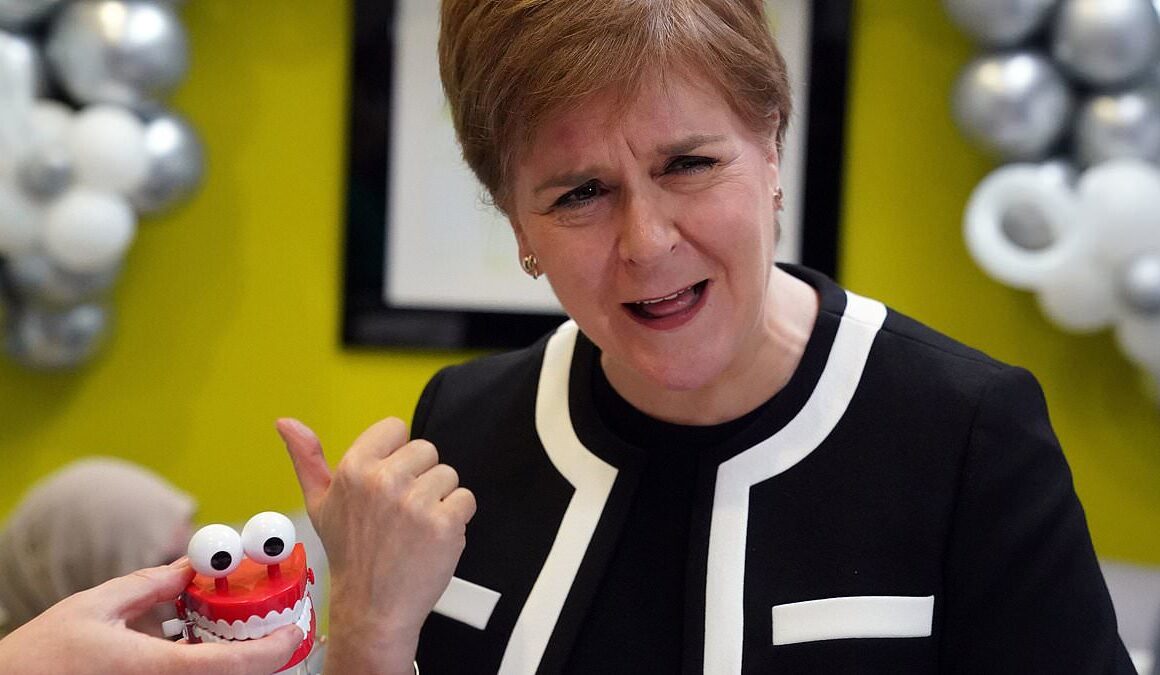It’s very difficult not to feel that rape victims in Scotland’s capital city have been used as part of a grubby experiment.
When Mridul Wadhwa applied for the position of chief executive of Edinburgh Rape Crisis Centre in 2021, she should not have been invited to interview.
The post was expressly advertised as being for women only, yet Wadhwa, a biological male who identifies as a woman and who was not in possession of a gender recognition certificate, was not only interviewed, but was given the job, and then celebrated by the great and the good. Of course, a selfie with Nicola Sturgeon exists.
We now know – thanks to the findings of an employment tribunal last month – that Ms Wadhwa was involved in “a heresy hunt” against a former staff member who held the surely uncontroversial view that a woman who has suffered rape is entitled to know whether the support worker assigned to them is male or female.
Roz Adams was hounded out of her job by someone utterly unfit for leadership.

Former First Minister Nicola Sturgeon championed controversial laws which would have allowed trans people to self-ID
It has emerged this week that, quietly, Wadhwa has been placed on leave pending the outcome of an investigation into the circumstances of Ms Adams departure. Given the strength of condemnation from the tribunal last month, it seems unlikely that the chief executive will return to the organisation.
I’m certain those who hired Ms Wadhwa and those who cheered on this great “progressive” act would like the whole messy business to be forgotten. But it should not be. Indeed, the Wadhwa case stands as the perfect example of how extreme ideology infects and then destroys organisations. Not only must it not be forgotten but lessons must be learned from it.
It may be the case that, when the position of chief executive of Edinburgh Rape Crisis Centre became vacant three years ago, there truly were no suitable female candidates. I struggle to believe that but one never knows. If, however, there were women willing and able to do the job then we can see Ms Wadhwa’s appointment for what it was – an entirely political act.
The same government-funded activist groups that cheered on former First Minister Nicola Sturgeon’s unworkable plans to allow trans people to self-ID saw Ms Wadhwa’s appointment as a significant victory in an ideologically-driven campaign. Ms Wadhwa, I’m afraid, was not hired because this was the best outcome for those women using the services of Edinburgh Rape Crisis Centre but because the appointment symbolised “progress”.
It should not be remarkable to say that Ms Wadhwa should never have been appointed to the position she continues, for the time being, to hold.
But we know that accusations of transphobia – sometimes career-ending – are liable to follow any criticism of this “pioneering” figure.
The contemporary trans rights movement, with its violent slogans and its refusal to accept biological reality, has cowed many politicians into silence. Fearful of being accused of bigotry, too many say nothing even when faced with situations that – to most voters – are, at best, absurd and, at worst, downright dangerous.
Not only was Ms Wadhwa involved in an ideological campaign against a devoted and experienced support worker, but under their regime Edinburgh Rape Crisis Centre appears to have offered support to a biologically male sexual predator with “hostility towards women”.
Last week, Cameron Downing, a former equalities officer with the SNP who identifies as ‘non-binary’ was given a nine-year prison sentence for a catalogue of sex attacks. A video later emerged in which he thanked ERCC for its help.
To the list of statements which should, surely, be uncontroversial might we add “dangerous male predators should not have access to support services for vulnerable women”?
It should be pointed out that ERCC’s service, according to the organisation’s website, is open to anyone who ‘self identifies as a woman, trans woman, trans man or non-binary person’.
It is a sign of how tight the activists’ grip is on government that no minister has felt the need to say much about the scandal at Edinburgh Rape Crisis Centre.
This is not good enough. The women who depend on ERCC and other organisations that come under the Rape Crisis Scotland umbrella deserve some clarity about the services they might expect to receive.
What’s more, there is public money involved here and we must be sure that it is not being wasted in defending tribunals caused by bullying ideologues. I can’t imagine there are many people – perhaps, beyond the occasional Green party crank – who thinks there’s nothing to be investigated in this case.
When it comes to the discussion of “trans rights”, politicians (the Scottish Conservatives, aside) and public are not in the same place. Voters did not agree with Nicola Sturgeon’s self-ID plans and I would venture that putting biological males in charge of rape crisis centres is even less popular.
When Ms Sturgeon and others in the nationalist movement saw Mridul Wadhwa as an icon of the progressive left, they couldn’t wait to have their photo taken with her. Now, well, I imagine they’re all hoping she fades into obscurity.
It is not only in the area of support for female survivors of sexual assault that gender ideology has been allowed to run wild.
Last week it emerged that a government-funded literary organisation faces being would up after a backlash against advice to bookshops not to sell titles written by so called “gender critical” authors. Literature Alliance Scotland (LAS) claimed Terfs (trans-exclusionary radical feminists) were joining forces with fascists and called on venues not to offer them a public platform.
Quite rightly, the alliance’s chairwoman and several members of its board have resigned, accepting full responsibility for a “lack of oversight” in allowing a briefing document, containing the call for a ban on “Terf books”, to be published on its website.
Across the public sector, gender ideologues have pushed for policies that go way beyond the law. But those in the grip of gender ideology are rarely those who suffer its negative impacts.
When Nicola Sturgeon and other senior politicians squirmed about the decision – quickly overturned amid public fury – to send rapist Isla Bryson, formerly known as Adam Graham, to a women’s prison after Bryson began self-identifying as a woman, they seemed not to care about the often vulnerable female prisoners who were expected to share those same facilities.
Mridul Wadhwa should never have been put in charge of a service for vulnerable women.
Those responsible for the appointment would very much like us all to forget what they did. We must not do so.
Some incredibly vulnerable women have been failed by a service corrupted by a pernicious ideology. The employment of Mridul Wadhwa as chief executive of Edinburgh Rape Crisis Centre was an experiment that went badly wrong.








